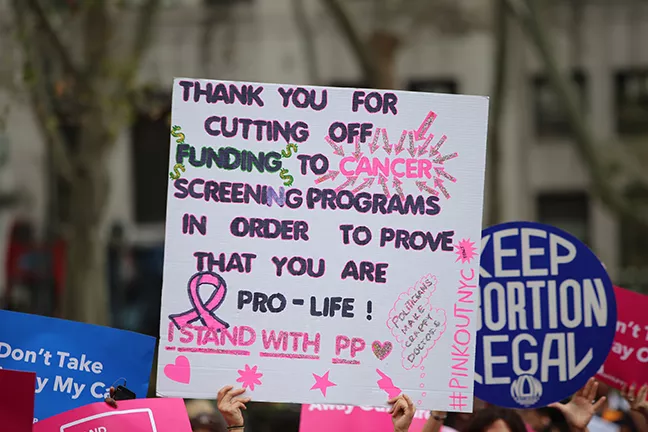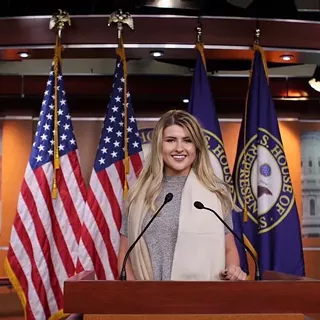Dr. Samantha Varner says it would be a "fundamental corruption" of her medical training and professional ethics if she couldn't inform her patients of all their family-planning options.
"I have had the conversation of pregnancy options a hundred times over," says the OBGYN Banner University Medical Center resident. "And I can tell you the most important part that sticks in my mind is the relief on my patient's face when I tell her she doesn't have to stay pregnant if that is not her choice and how grateful she is for my guidance and support when she leaves my office with clear, accurate information."
The Trump administration is aiming to reinstate the Reagan-era "domestic gag rule," which prohibits healthcare providers who receive Title X federal funding from counseling or referrals concerning abortion services. This could lead to many low-income and uninsured Americans losing access to reproductive healthcare and family planning services.
The gag rule was rescinded in 1993 under the Clinton administration, and if restored, Planned Parenthood affiliates across the country would have to either cut their abortion counseling and services or lose up to $60 million in annual Title X funding.
In Arizona, roughly 20 percent of the 35,000 patients who visit Planned Parenthood clinics have their care covered by Title X, accounting for about $2 million a year.
Nationwide, Planned Parenthood serves 41 percent of the more than 4 million people who rely on Title X annually. If patients can no longer get their reproductive healthcare at Planned Parenthood, well over a million low-income and uninsured Americans—the majority of whom are young, low-income and minority women—may have to look far and wide for another healthcare clinic that specializes in preventative reproductive healthcare services, such as STI and cancer screenings.
The gag rule would affect 4,000 healthcare providers nationwide, according to the National Family Planning and Reproductive Health Association. And in many counties, Planned Parenthood is the only clinic that provides reproductive services to low-income people who don't qualify for Medicaid.
At Banner, which doesn't receive Title X funding, Varner has seen patients whisked to emergency rooms because of birthing complications due to a lack of prenatal care. She's seen the outcome of her patients' lives drastically change because of lacking access to fundamental reproductive healthcare services. And she fears without Planned Parenthood, low-income people will have an even harder time accessing essential preventative services.
"The Domestic Gag rule...would most certainly bring more women to my doors under these circumstances: in emergency, in crisis, with preventable [medical conditions]," Varner says. "This is an unacceptable intrusion of doctor-patient confidentiality, and it should not be allowed to stand."
Many low-income people who receive healthcare services from Planned Parenthood in Arizona are covered by AHCCCS, the state's version of Medicaid. Title X covers people who don't have health insurance. Their income level may be too high to qualify for AHCCCS although they still might not earn enough to afford insurance. These federal funds can't pay for abortions, but they do cover the cost of cancer screenings, STI testing and treatment, birth control, contraceptives and more.
Arizona Family Health Partnership manages the Title X funds for the state. If the gag rule is enforced, AFHP could not provide funds to Planned Parenthood, essentially preventing low-income patients who qualify for Title X coverage from using the nation's largest provider of reproductive health services.
Planned Parenthood leaders have said they will never stop offering abortion care or comprehensive family planning. Should the rule go into effect, the clinic doors would not close, but only insured people and those who can pay out-of-pocket would receive services.
"We counsel all of our patients about all of their options when they are faced with an unplanned pregnancy," says Jody Liggett, Vice President of External Affairs for Planned Parenthood Arizona. "We will always do that, and we are not going to shame or stigmatize our patients that have questions about abortion care."
Earlier this month, Planned Parenthood hosted a roundtable discussion event at which their staff, along with medical professionals and members of the Tucson community, were able to discuss Title X and what women's healthcare would look if the gag rule is successfully enforced.
U.S. Rep. Martha McSally (R-AZ02), who is now running for the retiring Jeff Flake's U.S. Senate seat, was invited to the event via an online video posting, phone call and email but did not attend. McSally's office in Washington, D.C., said at the same time as the event, McSally was hosting Secretary of Homeland Security Kirstjen Nielsen for a tour of the U.S.-Mexico border in Arizona.
McSally voted to block low-income patients from using Planned Parenthood services in 2015, and has repeatedly called for the organization to be blacklisted from the list of qualified providers of healthcare for women and men seeking treatment.
Liggett says that although McSally has said that women could simply go to general health clinics for reproductive health services if Planned Parenthood's doors were to close, community health centers and Planned Parenthood work best when they work together.
"The community health centers are not experienced in providing complex sexual health services, especially women's services," Liggett says. "They are amazing partners to us. We refer back and forth; we work together. It doesn't make sense to remove either one of us from the safety net that affects low-income patients."
According to a press release from the White House, the gag rule would "ensure that Federal funds are not used to fund the abortion industry...and ensure that taxpayers do not indirectly fund abortions." There is already a law prohibiting tax dollars' use on abortions, except in cases of rape, incest or when a woman's life is in danger.
More than 70 percent of Americans oppose Trump's proposed gag rule, according to a national poll by Hart Research Associates.
"We don't think that this makes sense, and the American people don't either," Liggett says. "We don't think it's constitutional, but it is a real threat. You certainly wouldn't kick the nation's largest, oldest and most experienced provider [of reproductive health services] out of the network if you really cared about women's health and wanted to reduce the number of abortions."
Planned Parenthood, National Family Planning & Reproductive Health Association and the American Civil Liberties Union all filed lawsuits against the Trump Administration last month for the proposed gag rule, citing that the amendment goes against the basic mission of the Title X program to prioritize comprehensive family planning and reproductive healthcare services to the four-million low-income and uninsured Americans who rely on it every year.
The policy announcement began a 60-day public comment period on June 1. Constituents can contact the Department of Health and Human Services through their website or can send a message to Congress through Planned Parenthood by texting their comments to 22422.
"This is a control issue; it's about controlling women and the decisions we make about our healthcare," says Tucson City Councilmember Regina Romero. "It's a deliberate strike at poor people and women of color in this country."
Marissa Ryan is a University of Arizona journalism student and a Tucson Weekly intern.








